Create an “external outline” of an ecosystem with independent developers: the results of the Skyeng API contest

The competition for projects using the open Skyeng API has come to an end; Today we present winners and prize winners. This, however, is only a preparatory stage for the creation of the “external contour” of our ecosystem. We plan to actively help our competitors to bring their projects to the state of high-grade products. Why do we need it, as well as whom and why we have chosen - in our article.
Participants and criteria
Our competition received 25 applications, of which 11 reached the final, i.e. were in a state of at least MVP (minimum viable version). Next, we scored four criteria :
1) Methodical utility for the student Skyeng (from 0 to 2 points). How much a competitive project helps to improve the efficiency of learning English.
')
2) Food utility for the student Skyeng (from 0 to 2 points). The further the competitive project from our existing products, the higher the score. The first two assessments overlap in part, but they were presented by different members of the jury, so they were separated.
3) The number of API methods used (from 1 to 3 points). In total, we have 5 methods open (searching a word in a dictionary, getting all the data about the meaning of a word, linking an Skyeng account, importing words from Skyeng, adding words to study into Skyeng applications), all five were able to be used in only one competitive project. We decided not to make estimates here from 1 to 5, since some projects simply do not need all the API methods; this would not be very fair to them.
4) Product availability (1 or 2 points). Extra score for the full featured version.
We decided that projects that received 0 in at least one of the first two assessments cannot become winners. The main goal of the competition is to expand our ecosystem with products that are useful for learning English by our students. In our opinion, competitive projects with an assessment of product utility 0 do not expand it, but only duplicate the functionality of the existing Skyeng Words application. They may have some additional bonuses, for example, training for speed or the presence of a huge number of languages, but the benefits of them for our ecosystem is minimal. And the projects, the methodological usefulness of which we estimated at 0, simply do not fulfill the function of learning. We are pleased that developers use our API, but this is not enough to win the competition.
Estimates gathered in such a tablet .
Winners and awardees
First place: Nail Galiaskarov, Readore
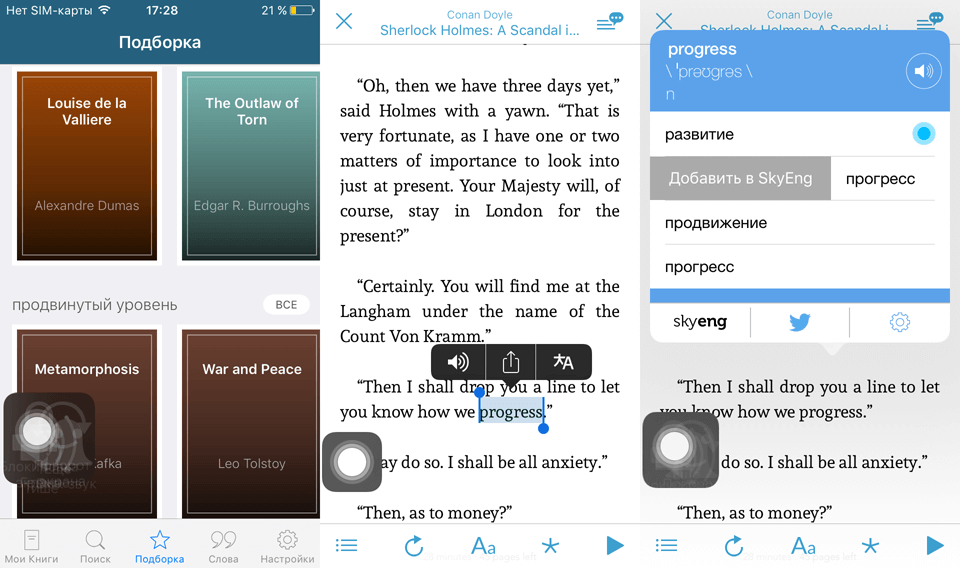
We have already talked about this e-reader for the iPhone with an educational bias and its own collection of books. In fact, we thought that there would be more such applications, since the idea lies on the surface: here there is an obvious benefit both for the student of the school, and for any person learning the language from books, and ready-made content in the form of these same books, including user uploaded. Nevertheless, only Readore project took part in the competition - a high-quality, well-developed and fully prepared reader that uses almost all the methods of our API. The obvious first place. It is a pity that there is no version for Android (hint!).
Second place: Cyril Lyakhov and the team Shakuro, SkyLocker

My first thought, when we saw Skyloker: “how could we not think of it ourselves ?!” This is a simple application that replaces the standard android-screen lock screen with vocabulary training. For now, all that is required is to choose the correct version of the word in English, in the future we plan to include other skills. In our experience, it is excellent as a consolidation of already learned words. By the way, this is the only project in the competition, created only and exclusively for students of the school.
Third place: Evgeny Kriulin and Mirbek Imarov, LennyBot
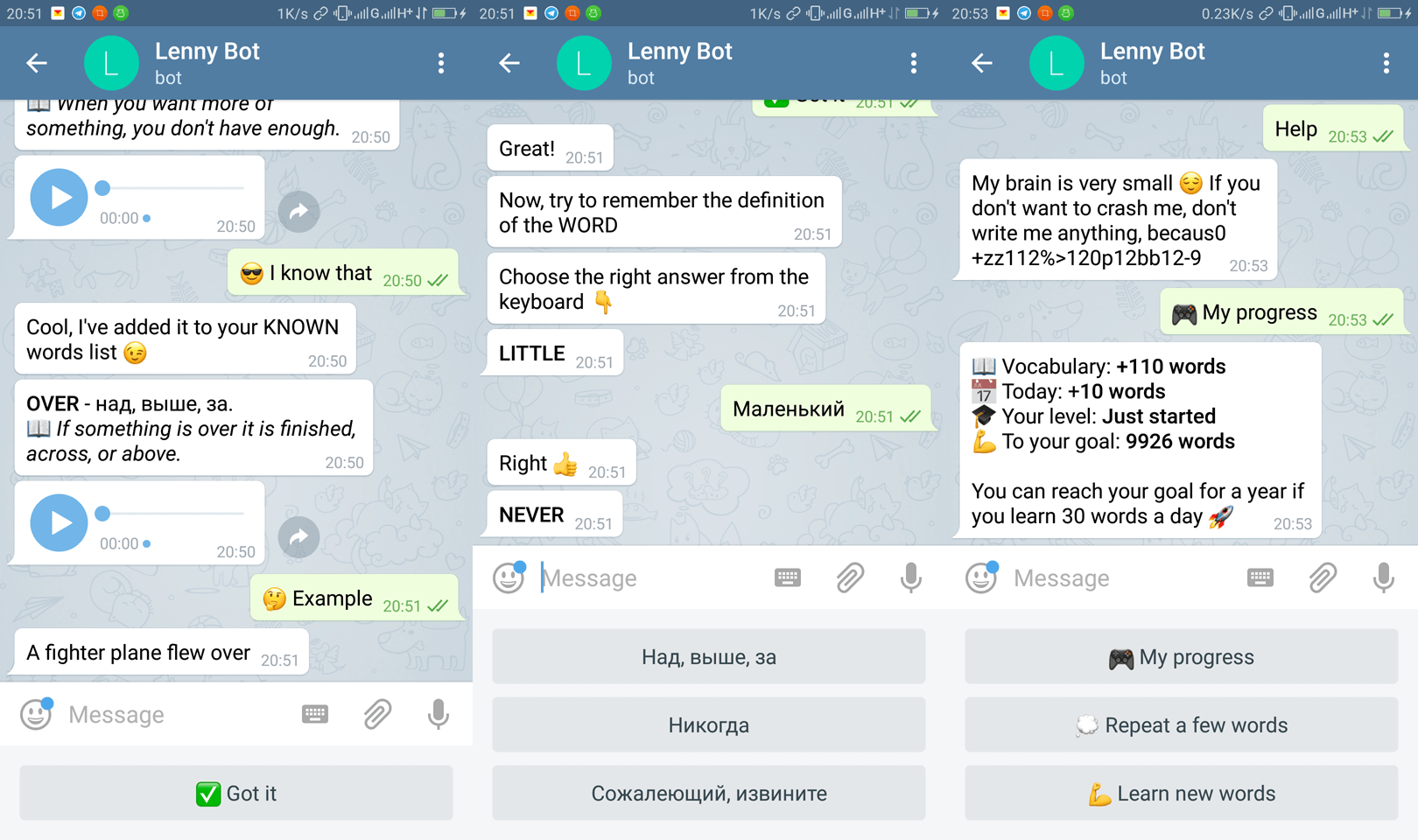
The reason why Lenny, in contrast to individual applications with the same functionality, turned out to be prize-winners: this is a bot. The bots have a different audience - people who are psychologically more comfortable to train without installing any third-party programs; As a result, there is an obvious benefit to some of our students. The API functionality is still limited, the authors plan to make a separate bot under our API, so as not to overload Lenny - in general, there is a prospect, and it pleases.
Third place: Sergey Novikov, ESLBot

Another bot, this time for Facebook. The functionality is even more limited, but bots are useful for our ecosystem, so it’s a well-deserved prize.
Third place: Dmitry Sadovnikov, Enwords
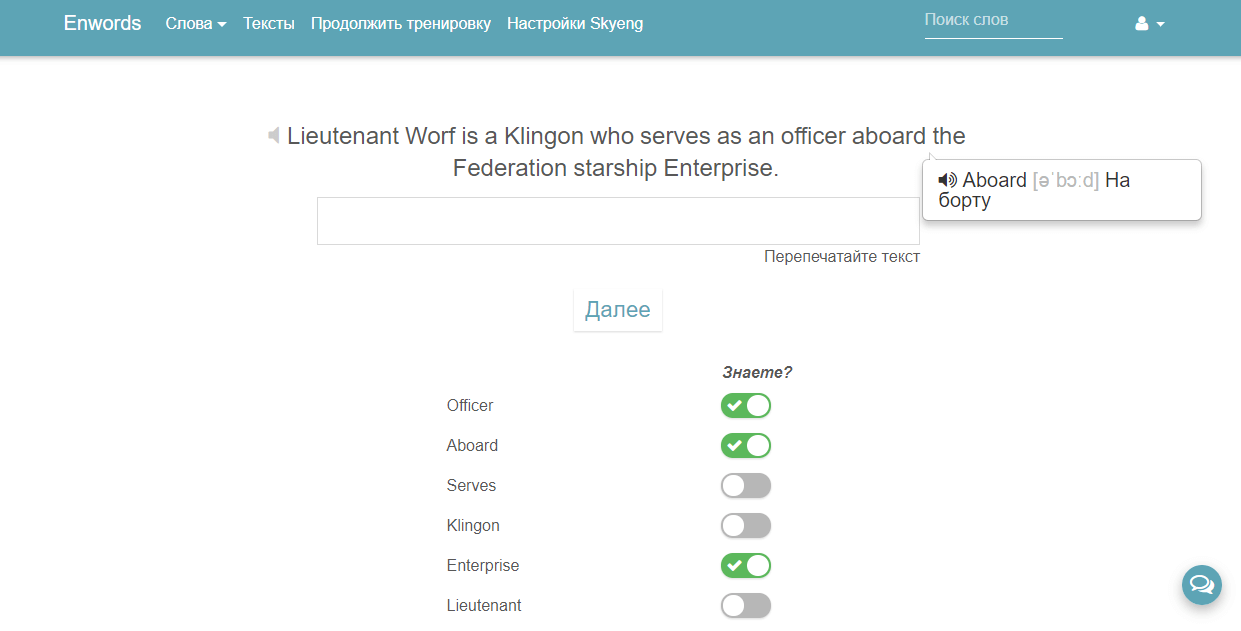
A site offering to train English words in context. While it looks like this: the site picks up sentences containing the right word, the user reprints them. The value of this workout is not obvious, but we see potential in this product. For example, if you include new API methods, you can thematically customize sentences for a lesson just passed by a student, or under lists of words taken for studying, or just for his interests. We think that with the help of our methodologists this site will become a valuable participant in the Skyeng ecosystem.
Third place: Vadim Bondar, Lingvasto
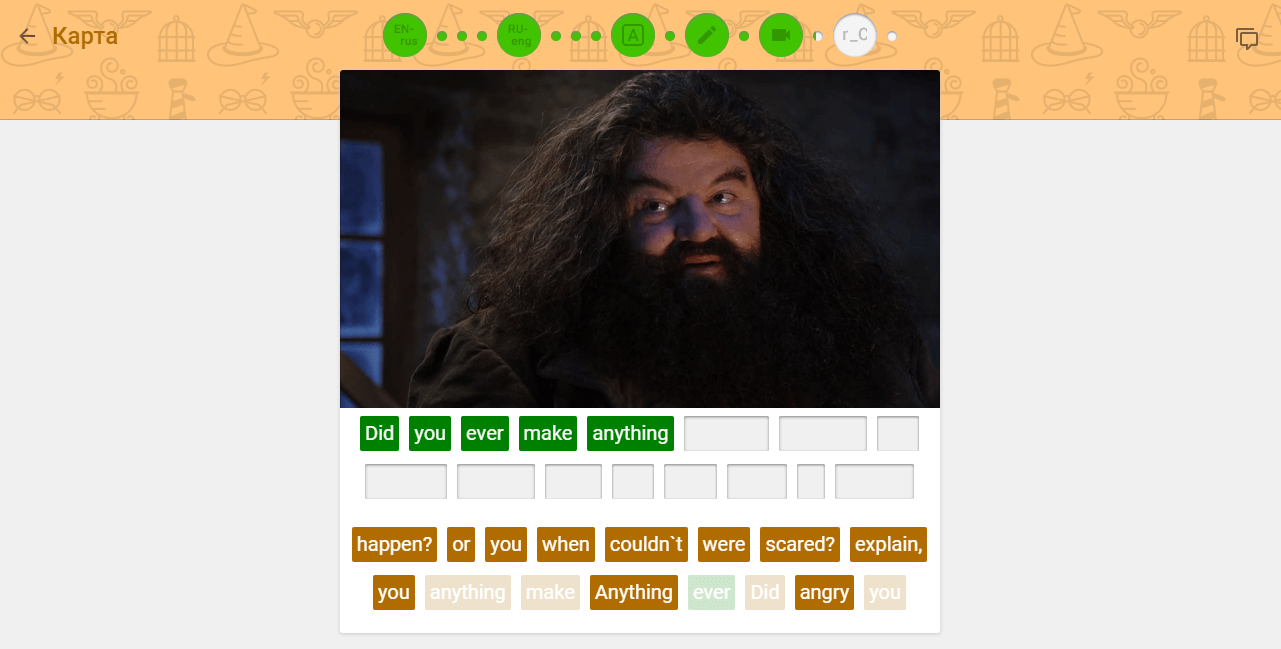
This game educational program charmed our methodologists, so to describe it we will give them the word (under the cut)
* Methodical comment *
1. Education in Lingvasto is gamified on the basis of the Harry Potter story. Waypoints show the theme of the task, which prepares the user, and the entire route is chronologically plotted through the book's plot, which can motivate the user to go see or read one piece in the original. Very pleased with the mechanics in the form of potions, magic items, grammar spells.
2. The basis is “edible pieces of material,” which prepares the user for perceiving a small portion of an unadapted video from Harry Potter, which at the end of the journey creates a “success story” - “wow, I trained a bit and understand the phrases, I’ll go I'll see the movie in the original. "
3. The service resembles a simulator, i.e. mini-workouts that work on different aspects of words: meaning, spelling, sounding of a word, learning it by ear, and as a result - recognizing that word in context. We go from simple to complex, which again prepares the student and gives him confidence, shows his progress, when he repeated / learned the words, and then he understood a whole segment.
4. The service is focused on different types of users: audials (they hear), visuals (they see pictures) and kinesthetics (they make interesting tasks).
* User Tips *
This service is for beginner levels (elementaries, with intermedia), which, based on your favorite movie, shows that even now you can watch something in the original. Tip - after passing the card, find this episode in a movie or book and watch / read all in small pieces. You can use a selection of words in the words Harry Potter application, and for reading - our browser extension.
Exercise regularly. A day is better not all at once, but by dosage. So that the words remain in the memory and there was no overload, but the interest remained.
2. The basis is “edible pieces of material,” which prepares the user for perceiving a small portion of an unadapted video from Harry Potter, which at the end of the journey creates a “success story” - “wow, I trained a bit and understand the phrases, I’ll go I'll see the movie in the original. "
3. The service resembles a simulator, i.e. mini-workouts that work on different aspects of words: meaning, spelling, sounding of a word, learning it by ear, and as a result - recognizing that word in context. We go from simple to complex, which again prepares the student and gives him confidence, shows his progress, when he repeated / learned the words, and then he understood a whole segment.
4. The service is focused on different types of users: audials (they hear), visuals (they see pictures) and kinesthetics (they make interesting tasks).
* User Tips *
This service is for beginner levels (elementaries, with intermedia), which, based on your favorite movie, shows that even now you can watch something in the original. Tip - after passing the card, find this episode in a movie or book and watch / read all in small pieces. You can use a selection of words in the words Harry Potter application, and for reading - our browser extension.
Exercise regularly. A day is better not all at once, but by dosage. So that the words remain in the memory and there was no overload, but the interest remained.
Despite the fact that the use of our API is minimal here, we decided to include it among the winners: it is a truly unique product with great prospects, whose game and educational mechanics are brought to the level of strong MVP, and screwing the API and filling the engine with content is a matter of technology. We are going to actively help this project to develop.
The remaining members of the top 11
Dmitry Lapaev, “More Words” is a dictionary application on Android, in which it is possible to add words to the “study” and “studied” lists with passing a small test. Unfortunately, the final usefulness of this product for our students was lower than that of rivals.
Alexander Bilchuk and Mikhail Zhikharev, Daily 5 is a cute Android application for training words with simple mechanics “choose the right translation”. An important plus is a huge number of languages. The authors have tried their best and were able to connect all the methods of our API for English. Unfortunately, this was not enough to win the competition.
Oleg Tabot, http://easylang.ru/ - a site where you can pick up books and movies to your level of English. However, it is impossible to read and see them there, the site provides only links to third-party resources. The author managed to connect the import of words from the Skyeng account, but all that it allows you to do is to see the number of unfamiliar words in the work, which in itself is uninformative. In general, an English recommended media content system would be a useful product, but we did not see any methodological value in providing the site in its current form.
Sergey Ilyushin, enWords Trainings is an iOS word training app, almost identical to our Words, except for the fact that it has training for a while. For obvious reasons, we are not ready to give a prize to products similar to our own developments.
Timofey Zhiganov, Flash Town is a multifunctional entertainment bot for Telegram, in which the authors have built in the function of translating words using our API. We are not against this use of our API, but the value of such a product for learning English from the point of view of our methodologists is minimal.
Plans and reality
A brief description of the objectives of the competition at the beginning of summer looked like this:
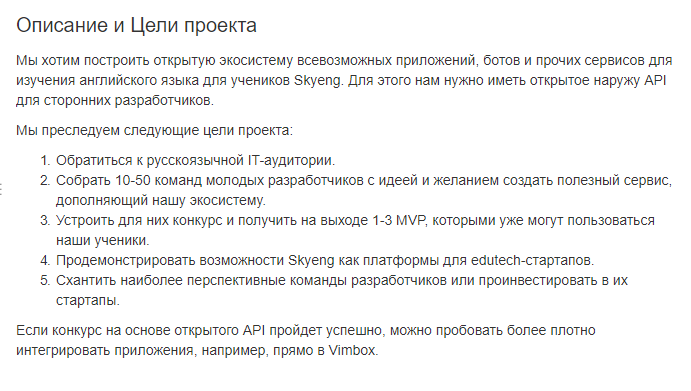
How do the results correspond to them?
1: We broadcast information about the competition to the IT community, including in our blog on Habré. Once again, we say that we are an IT company, and not just an English language school. This is a large and continuous campaign, the competition was a good informational occasion, but it is impossible to single out its effect.
2: We received 25 applications, which fit into the calculation framework; 11 of them reached the final part - well.
3: According to the results of the competition, we received 6 MVPs that were sufficiently developed and useful for our students, and we are ready to put it on the school window now - this is significantly more than we expected.
4: This task is related to the next step in creating the “outer contour” of the Skyeng ecosystem. Having laid out the projects of the winners of the contest on the Vimbox showcase, we will send them our traffic, a super-motivated target audience that already pays an average of several thousand rubles a month for learning English and who will not be sorry to give another penny for a useful application or service. Thus, we did not just open our API, we give startups an opportunity to earn money on our platform. And we, too, do not stay on the spot: we could write the same chat bots, but it would be more profitable for us to let someone else do them (and make money from them) by getting a new useful product in the ecosystem.
5: While in work. No one was put to bed, the investment option is being discussed. Various other ways to help projects, such as resources, are also discussed.
Application Integration: There is no direct integration into Vimbox yet, but we have a “Downloads” section, we’ll put links there. Theoretically, the option of integrating Enwords is possible, if it has something like its own API or widget, but for this, both we and the Enwords author will have to work a lot; economic feasibility has not yet been evaluated. In general, this item did not have a number, since it assumed the appearance of a rather specific competitive project - a ready-made widget, easily embedded anywhere. As an example, we looked at crosswords (hint!).
Present and future
The competition is a preparatory stage on the way to creating the “outer contour” of the Skyeng ecosystem. He allowed us to choose six winners (and a couple of interesting projects) whose products are in different degrees of readiness. At the next stage, we will have to work with them, looking for solutions to their problems, opening them with some new tools for working with our API, helping them with advice and deed. This work will lead not only to the appearance of complete quality products in our ecosystem, but also allow us to improve and expand its connecting mechanisms, as well as, possibly, to establish interaction between independent teams.
In general, interesting days are coming up, which will throw a lot of curious cases, which we will share with readers of "Habra".
As for the contests themselves, they, of course, will still be in one format or another, although, probably, with other prizes (focused precisely on the needs of specific developers). But you should understand that this is a formality: the real competition continues non-stop, and if you have an interesting development that is useful for our ecosystem, you can always fill out an application and join our pool of independent projects.
Well, if you want to be part of the Skyeng team, then we are always looking for talented developers !




Source: https://habr.com/ru/post/338362/
All Articles